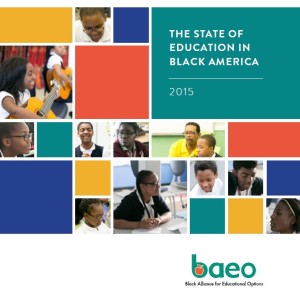 If you want to know why black support is so strong for school choice, talk to black parents and listen to Howard Fuller. In the meantime, read “The State of Education in Black America,” a new report from the Black Alliance for Educational Options.
If you want to know why black support is so strong for school choice, talk to black parents and listen to Howard Fuller. In the meantime, read “The State of Education in Black America,” a new report from the Black Alliance for Educational Options.
As we’ve written before, the struggle for educational freedom runs deep in African-American history. But nobody knows and speaks to that better than BAEO, a leader in the fight for 15 years. Its report, released last week, highlights the outrageous academic statistics that backdrop the legions of African-American parents who seek educational options for their children. It also offers plenty of historical nuggets, including a primer beginning on page 31, for anyone who somehow thinks this search is new, or alien, or some kind of ploy:
Black parental choice in America did not begin with the creation of charter schools or publicly funded voucher and tax-credit programs in the 1990s. Black parents’ demand for a quality public education in a non-segregated school did not begin with the Brown v. Board of Education decision in 1954. Black adults’ aspirations for higher education did not wait for congressional enactment of the G.I. Bill of Rights in 1944, nor did Black parents wait for systemic school reform with the creation of the federal Department of Education in 1867.
I wish choice critics would consider this history. Would they be so quick to condemn “vouchers” if their frame of reference included Southern slave codes, which made it a crime to teach slaves how to read and write? Would they still insist black choice supporters are being conned if they knew about the Marcus Garvey School in Los Angeles or the Piney Woods boarding school in Mississippi? Would they still see nefarious ties between schools and faith if they knew black churches have always been central to establishing quality schools for African Americans?
The BAEO report includes data on black student performance in charter schools, and in private schools accessed through vouchers and tax credit scholarships. It notes recent stories and research about the rise in black homeschoolers. And it offers advice for those who want to educate others about the need for options for black students: share the report with as many people as possible.
For those with an open mind, it’s there. For everybody else, we’ll press on.